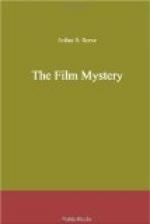At that instant a deafening explosion shook the studio and every building about the quadrangle, the sound echoing and re-echoing with the sharpness of a terrific thunderclap.
Mixed with the reverberations, which were intensified by the high arch of the studio roof, were the screams of women and the frightened calls of men. Following immediately upon the first roar were the muffled sounds of additional explosions, persisting for a matter of ten to fifteen seconds.
With every detonation the floor beneath our feet trembled and rocked. Several flats of scenery stacked against a wall at our rear toppled forward and struck the floor with a resounding whack, not unlike some gigantic slap-stick. One entire side of the banquet set, luckily unoccupied, fell inward and I caught the sound as the dainty gold chairs and fragile tables snapped and were crushed as so much kindling wood.
Then—a fitting climax of destruction, withheld until this moment—there followed the terrifying snap of steel from above. An entire section of roof literally was popped from place, the result of false stresses in the beams created by the explosion. Upon the heads of the unlucky group in the center of the ballroom set came a perfect hailstorm of broken and shattered bits of heavy ground glass.
For an instant, an exceedingly brief instant, there was the illusion of silence. The next moment the factory siren rose to a shrill shriek, with a full head of steam behind it—the fire call!
Kennedy dashed over to the scene where those beneath the shower of glass lay, dazed and uncertain of the extent of their own injuries.
“Where are the first-aid kits?” he shouted. “Bring cotton and bandages, and—and telephone for a doctor, an ambulance!”
It seemed to me that Kennedy had never been so excited. Mackay and I, at his heels, and some of the others, unhurt, hurriedly helped the various victims to their feet.
Then we realized that by some miracle, some freak of fate, no one had been hurt seriously. Already a property boy was at Kennedy’s side with a huge box marked prominently with the red cross. Inside was everything necessary and Kennedy started to bind up the wounds with all the skill of a professional physician.
“Mackay,” he whispered, “hurry and get me some envelopes, or some sheets of paper, anything—quick!” And to me, before I could grasp the reason for that puzzling request: “Don’t let anyone slip away, Walter. No matter what happens, I must bind up these wounds myself.”
A few moments later I understood what Kennedy was up to. As he finished with each victim he took some bit of cotton or gauze with which he had wiped their cuts, enough blood to serve him in chemical analysis, and handed it to Mackay. The district attorney, very unobtrusively, slipped each sample into a separate envelope, sealing it, and marking it with a hieroglyph which he would be able to identify later. In this fashion Kennedy secured blood smears of Manton and Phelps, Millard and Kauf and Enid, Gordon, the two camera men, and a scene shifter. I smiled to myself.




